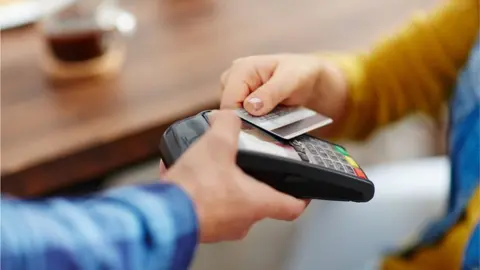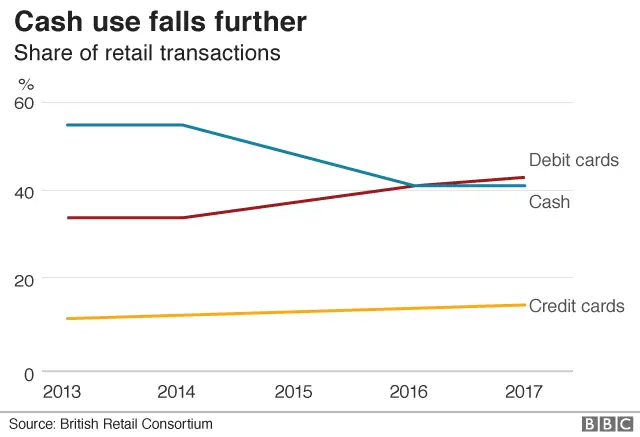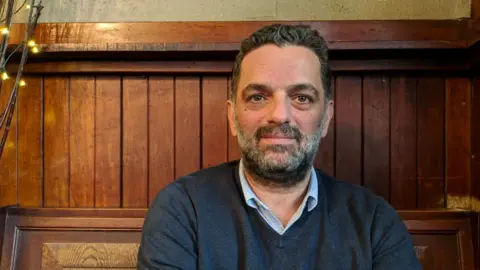Millions 'will suffer without cash'
 Getty Images
Getty ImagesThe UK risks "sleepwalking" into becoming a cashless society with millions of people disadvantaged as a result, a study has concluded.
Banknotes and coins are a necessity for eight million people, according to the Access to Cash study.
The report, authored by ex-financial ombudsman Natalie Ceeney, said a cash-free society would create problems for those in debt or living in rural areas.
Last year, debit cards overtook cash as the UK's most popular payment method.
Cash use has halved in the past 10 years, with notes and coins now handed over in three in every 10 transactions. Cash use is forecast to halve again in the next decade.

"As cash use continues to fall, we need to safeguard the use of cash for those who need it, and at the same time work hard to ensure that everyone can participate in this digital economy," Ms Ceeney said.
Her report was paid for by cash machine network operator Link, but was independent from it.

No cash for a pint

After yet another break-in at south London pub the Crown and Anchor, Arber Rozhaja decided enough was enough.
Burglars were after cash lying around after lock-up, but what if there was never any cash on site at all?
Mr Rozhaja, operations director at the pub's parent firm, London Village Inns, calculated the volume of cash transactions and was bowled over.
"Somewhere in the region of 10-13% of the total revenue would be cash and the rest was card," he says.
So in October, the Crown and Anchor went fully cashless.

In some sectors, cash is still used frequently. Some 74% of people use cash to give to charity and window cleaners are paid with notes and coins in 85% of cases.
More generally, there are various risks highlighted in the report from a cashless society. They include:
- Struggles in rural communities where alternative ways of paying would be affected by poor broadband or mobile connectivity
- Difficulties for some people with physical or mental health problems who find it hard to use digital services
- Rising debt levels, owing to budgeting being easier with cash
- Lost independence for those who use cash as a lifeline when in difficult or abusive relationships
- Higher prices for those who are unable to benefit from online services or direct debits
Ron Delnevo, executive director for the European ATM Industry Association, said: "The UK public remain heavily committed to cash use and this must be respected by all payment market participants, however disappointing that might be for their narrow commercial interests."
UK Finance, which represents banks, said that a mix of different ways to pay was vital for consumers.
"Our own research shows that while cash usage is declining, it will still be the second most common payment method in 10 years' time," said Eric Leenders, from UK Finance.
"Maintaining access to cash is vital to ensure no customer is left behind. From over-the-counter withdrawals through 11,500 Post Offices and cashback from retailers, to investment in ATMs and mobile bank branches to reach more rural communities, the finance industry is using a range of solutions."

